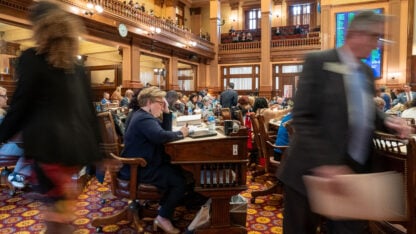How proposed immigration legislation has already played out in Georgia

Lawmakers have one more day to pass a bill requiring law enforcement to enter partnerships with the Department of Homeland Security to enforce immigration law, a strategy not new to Georgia.
Republican lawmakers want to require jurisdictions to take up more immigration responsibilities, citing both the federal 287g program or Secure Communities, both with Immigration and Customs Enforcement (ICE).
One part of HB1105 would have ICE deputize local officers to identify, detain and process noncitizens for deportation. Six jurisdictions in Georgia are already in agreements like this, and two counties joined and then left the 287g program.
Oconee County’s Sheriff’s department entered into an agreement with ICE in 2019.
“We have a number of certified peace officers that work in the jail who went through the training program with immigration service, and are credentialed warrant service officers to be able to serve those detention warrants,” said Sheriff James Hale Jr.
Oconee County has what’s called a Warrant Service Officer Program under 287g, where people who are arrested and have their fingerprints taken are run through state and federal databases. If ICE wants to detain an arrested noncitizen, it informs the sheriff’s office by issuing an immigration detainer.
ICE issues immigration detainers on noncitizens arrested on criminal charges because immigration officials believe there might be a reason to deport the noncitizens. ICE then takes the person into immigration detention once they are released from the local jail and determines whether they can deport the person or not.
“We’re not out here going around looking for undocumented people just to bring them to jail for charges just so that we can get them deported or anything like that,” Hale said. “It’s more of us doing our part.”
Both Cobb and Gwinnett Counties originally signed up for 287g programs. After years of immigrant rights advocacy and newly elected Democratic sheriffs, both counties dropped the programs. Plus, the demographic makeup of each community had changed.
Advocates say partnerships like this end up disproportionately targeting nonwhite people who have to show legal status when they encounter police.
In Cobb County, law enforcement also wants to make sure everyone feels they can report any information they may have about a crime or call the police if they are the victim of a crime, regardless of legal status.
Carlos Garcia is the sheriff’s Latino liaison.
“All of us want to live in a safe and secure community,” he said at a press conference in Mariette, “but when we marginalize a specific individuals for their legal status, we create an issue for everybody.”
The legislation has to receive final approval from the House before it goes to the governor.








